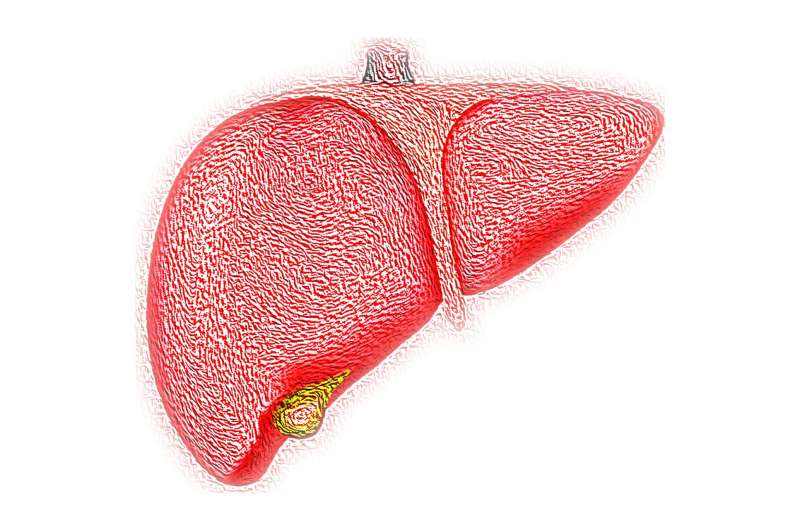Experimental drug to treat liver cancer shows evidence of activity with manageable side effects

A new drug that inhibits an enzyme playing a crucial role in cell division and growth has shown signs of anti-cancer activity with manageable side effects in liver cancer patients who have been treated unsuccessfully previously with up to three lines of treatment.
Presenting the findings on Friday at the 34th EORTC-NCI-AACR Symposium on Molecular Targets and Cancer Therapeutics in Barcelona, Spain, Dr. Maria Reig, head of the Barcelona Clinic Liver Cancer (BCLC) Unit at Hospital Clinic Barcelona, Barcelona University, Spain, said, "Primary liver cancer is the sixth most common cancer and among the leading causes of cancer-related deaths worldwide. Although new treatments options are becoming available, the overall prognosis for advanced liver cancer remains poor. I wanted to find new treatments for this cancer."
NMS-01940153E has been designed to be a very potent and selective inhibitor of Monopolar Spindle 1 (MPS1), which is a kinase (a type of enzyme) that is overexpressed in several cancers including liver cancer. MPS1 plays a critical role in regulating the processes involved in cell division and growth and, if it malfunctions, it leads to cancer.
Dr. Reig said, "Preclinical work demonstrated that NMS-01940153E was highly effective in preventing the proliferation of cancer cells, both on its own and in combination with other anti-cancer drugs. It seems more potent than other kinase inhibitors in liver cancer cells and so we are testing it, as a single agent, in a phase I clinical trial in liver cancer patients."
In a trial called MPS-153-001, NMS-01940153E was given intravenously to 12 patients with liver cancer on days 1, 8 and 15 every four weeks at increasing doses starting at 100mg per meter of body surface area per week (100mg/m2/week). The patients had all had previous treatments with up to three other anti-cancer drugs that eventually failed to halt the cancer.
By August 16, 2022, ten patients had discontinued treatment, seven due to their disease progressing. Out of 11 patients who could be evaluated to see if the drug was making an impact on the cancer, cancer shrank by at least 30% (a partial response) in two of them for 2.5 and 9.3 months. Both discontinued treatment after their cancer started to grow again at 6.5 and 11.1 months, respectively. Two further patients had long-lasting stable disease (the cancer neither grew nor shrank) and are still receiving the treatment after 11 and 18 cycles.
Dr. Reig said, "At the 100 mg/m2/w dose, one of six patients who could be evaluated, had a partial response to the study drug. At the 135 mg/m2/w dose, one of five had a partial response. Since each patient had three prior failures with standard treatments, the responses to NMS-01940153E are a strong sign that this new mechanism might be valuable in liver cancer, especially for patients whose cancer has already failed to respond to standard options."
When doses were increased, two patients experienced neutropenia (reduced white blood cell counts) with either sepsis or a urinary tract infection at a dose of 135mg/m2/week—side effects that were serious enough to halt an increase in dosing. Other side effects included abnormally-colored urine (chromaturia), low platelet counts (thrombocytopenia), anemia, weakness, diarrhea, and reaction at the site of the injection, but there was no drug-related death.
"Neutropenia was the main adverse side effect but it was always quickly reversible and mostly managed carefully with observation and dose reductions by the treating physicians," said Dr. Reid.
NMS-01940153E is currently being evaluated in a phase II clinical trial in patients with liver cancer that cannot be treated with surgery and whose cancer has failed to respond to the existing standard treatments.
"NMS-01940153E represents a new type of treatment, working in a very different way from the current options for treating liver cancer; therefore, it offers potential to help patients in the future," said Dr. Reig. "This is a small study, so the results will need to be shown in larger studies. The strength of the study is that the effect of NMS-01940153E appears to be realistic, due to the history of prior treatment failures of these patients and the early pattern of response we observed. Therefore, these results suggest that NMS-01940153E should continue to be studied in liver cancer and this is happening in the phase II trial, which started in August 2022 and is expected to continue to 2024 at centers in Spain and Italy."
Professor Ruth Plummer, from Newcastle University, UK, is chair of the 34th EORTC-NCI-AACR Symposium and was not involved with the research. She said, "Drugs to prevent cancer cells dividing and proliferating have not shown much benefit in the clinic for patients with liver cancer so far. Liver cancer is one of the most fatal diseases; the percentage of people with advanced disease who are still alive five years after diagnosis is measured in months rather than years. Therefore, new and more effective treatments are needed urgently. The results from this small study are encouraging and the phase II trial should give us more information about the safety and efficacy of NMS-01940153E."
More information: Abstract no: 3LBA, "NMS-01940153E, an MPS1 inhibitor with anti-tumor activity in relapsed or refractory unresectable Hepatocellular carcinoma", by Maria Reig, presented in plenary session 7 'Late breaking and proffered papers', 15.00-16.30 hrs CET on Friday 28 October.





















